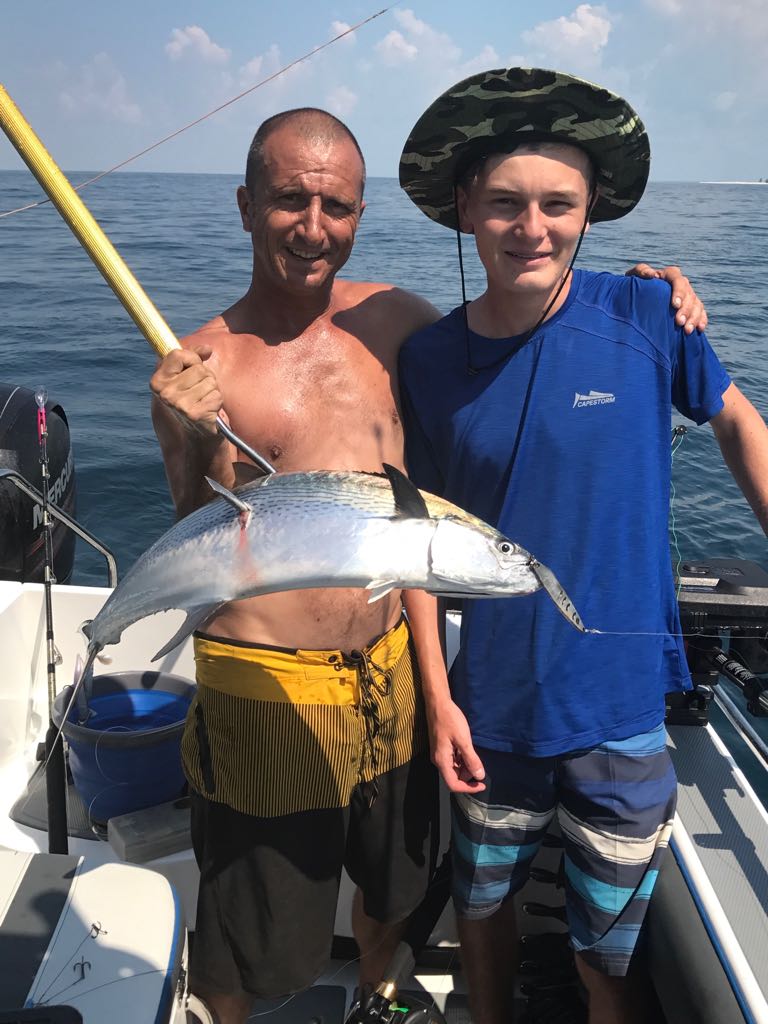
Catching Queen Mackerel at Margaruque Island
Catching Queen Mackerel at Margaruque Island: winter fishing up in the Bazaruto Archipelago can be challenging. The outside can go real quiet some days. The water gets right down to 23 or less. And even sometimes goes green.
Luckily there are always the inside channels. Between and around the islands. That you happily fish. In calm and clear waters.
Shallows
These shallow waters play host to all sorts of game fish to get tangled with. These fish are eager to jump on any well-fished lure. You can make up a quick spread of surface feather-type lures. And troll them around at a medium-fast speed. Maybe even some swimming-type hard lures too. MYDO Stripbatswimmers are purpose-designed for this type of fishing.
But…
It’s your 20 or 30-lb braid-laden spinning outfit that you will want in your hands at all times (or your fly rod). That you sight-cast to feeding fish. That you can see in the flat sea conditions of the channels, right across the sheltered water.
Queen Mackerel
These beautiful gamefish love the shallows. In fact, you will never find them much deeper than 10 meters. Along the backline is their hunting ground. And when there are no waves like here on the inside of the islands, they come right in. To find a shoal of these guys in 2 or 3 meters of water, on the boil, is heaven on water.
Chuck a tiny little spoon at them, and retrieve it fast. Watch the explosions. When they feed like this, you can catch one after the other. They release well too – swimming away no problem, fish after fish.
Don’t forget to keep one for the pan. Best tasting gamefish out there! Fried in an egg batter, this stuff is tender, moist, and unforgettably delicious. Mix the crushed garlic and herbs in the batter for best results. Cook very lightly.
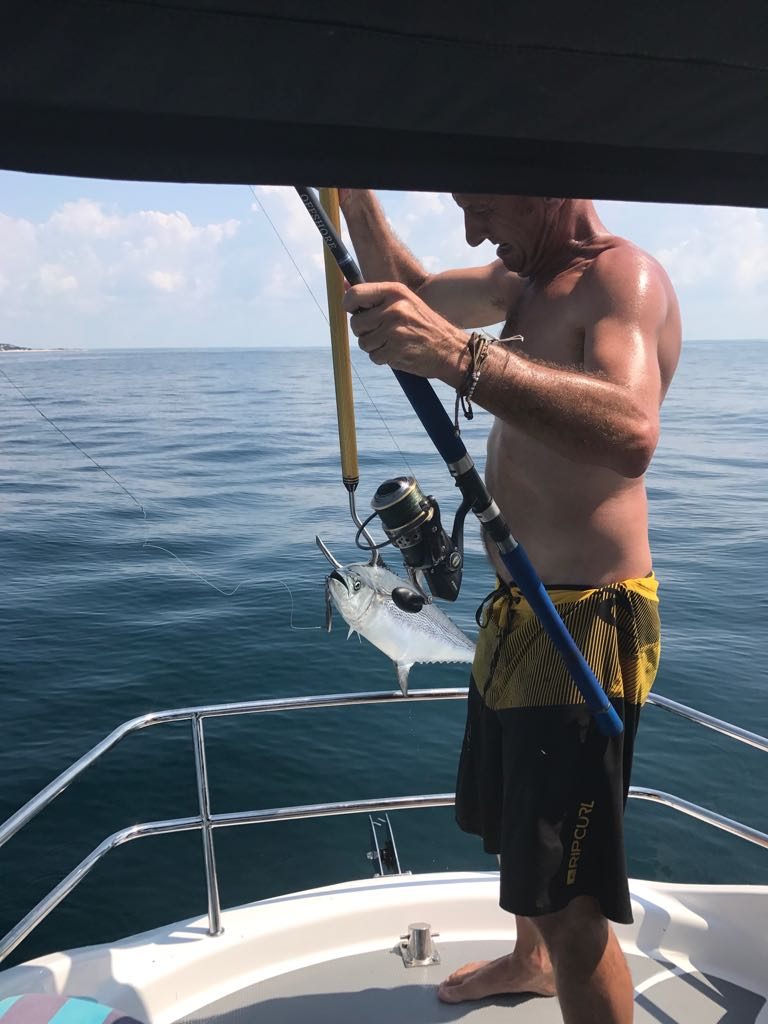
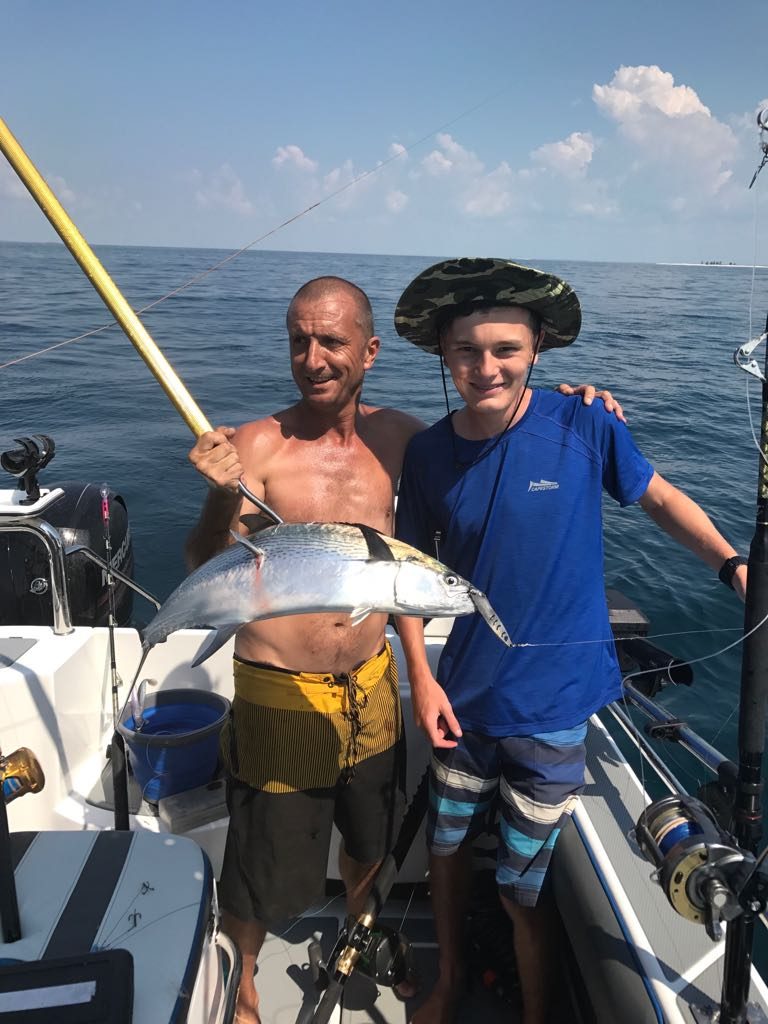
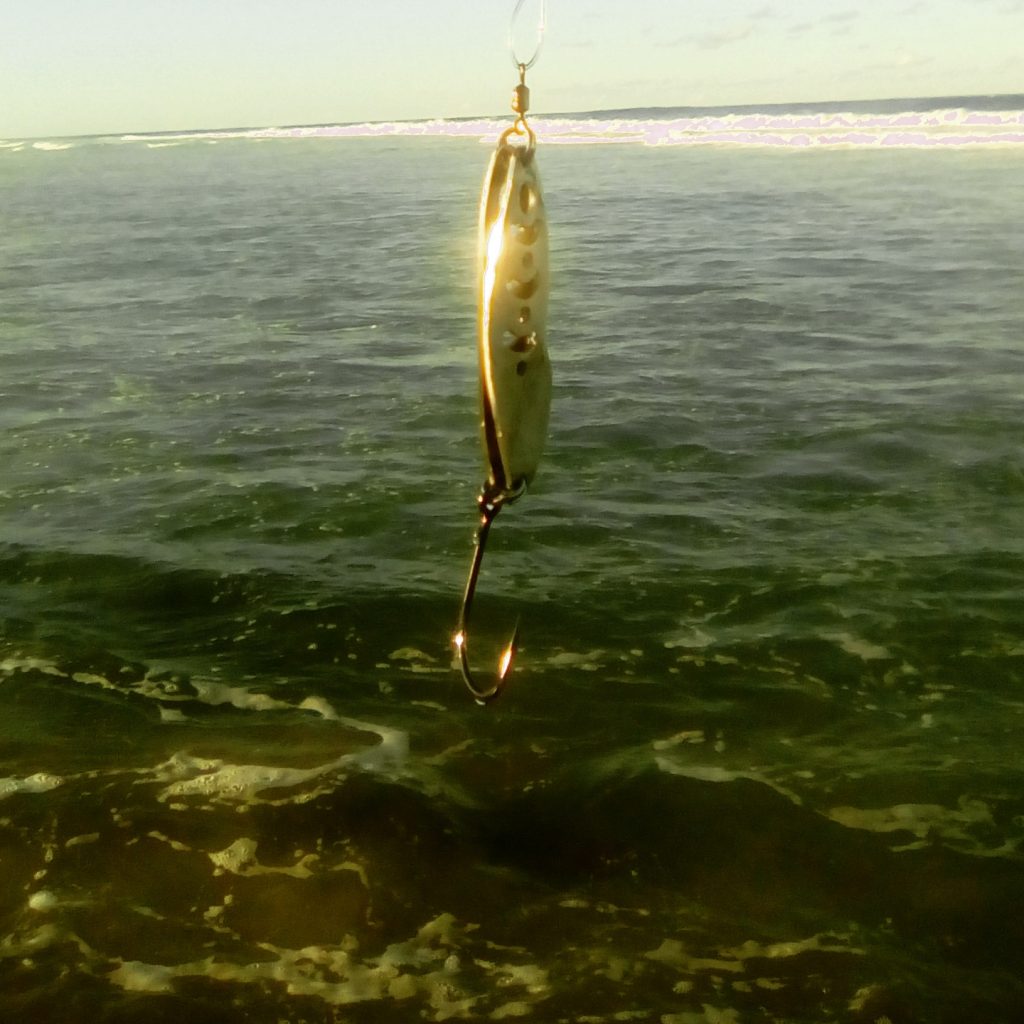
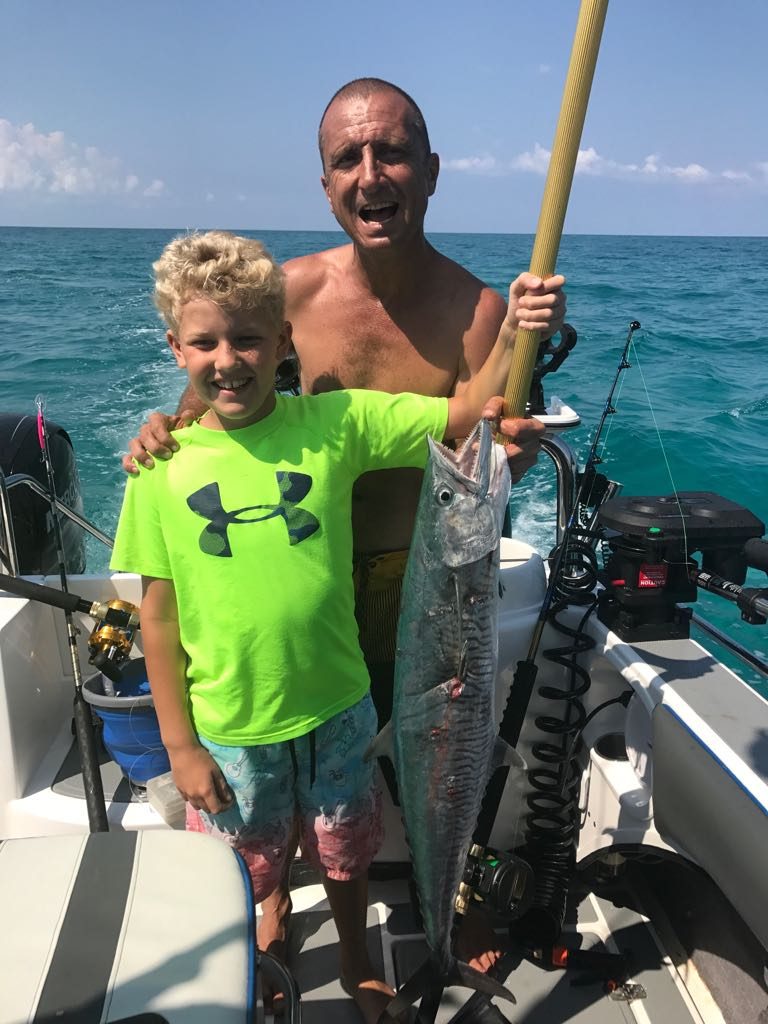
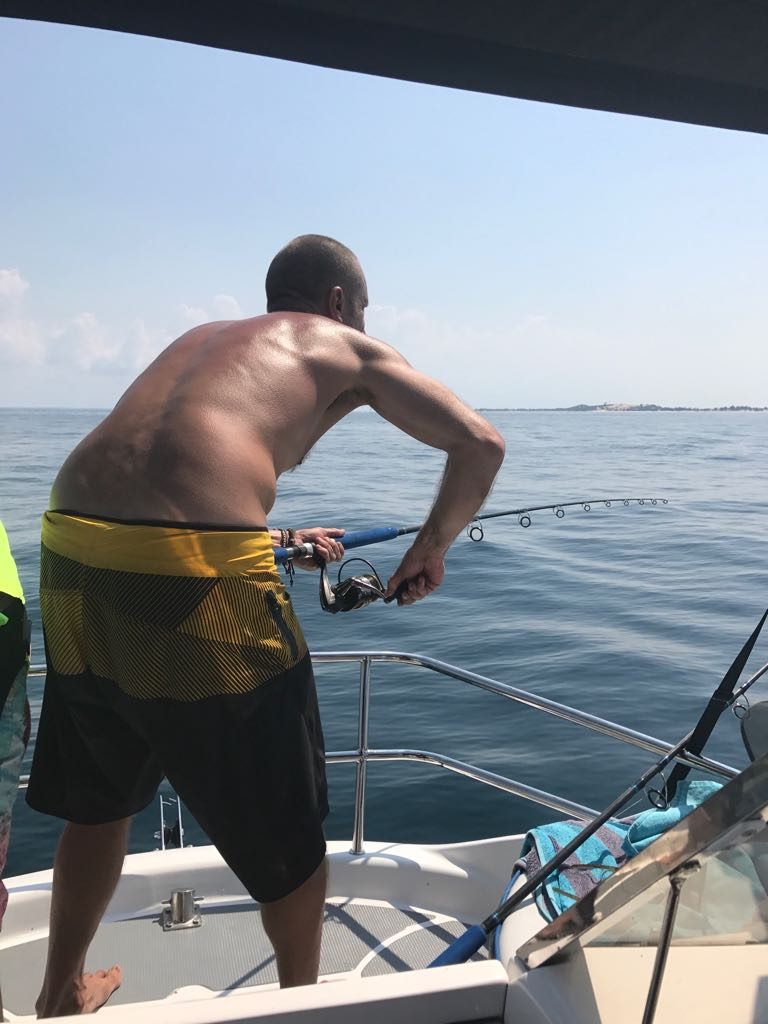
King Mackerel
Yip, right in the shallows too. Most of the really big guys taken are caught or shot, right in the backline anyway.
Margaruque has a lovely beach and chilling spot on its north point, just in from the GT stone…on quiet days, we can drop off the girls and kids, to snorkel and swim…whilst we head out to the deep.
Whilst the show was being unloaded from the boat, I started rigging up for the deep. On each of the outriggers, on the bottom clip, I rigged two surface swimming baits. These are Mydo Baitswimmer #1’s with a duster on top. Underneath the skirt all dressed up in trebles, on one one side – a halfbeak. And the other side, a long juicy, shiny fillet of skipjack bonito.
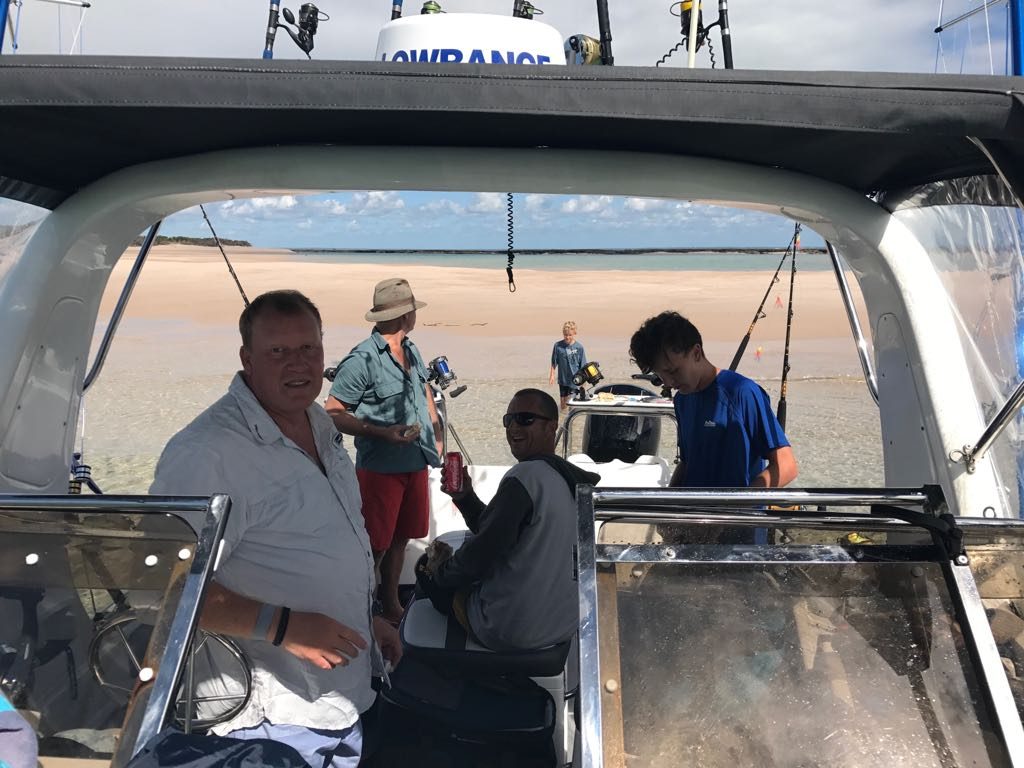
So these things are dangling in the water with the line running through the clip, no elastic needed. WIth all the extra passengers off the boat now, we push off the beach and into the channel. I let the bait in front of me out – the halfbeak, whilst I could still see the bottom. The bait sank to the sand as I free-spooled…when it was barely 8 meters behind the boat I engaged the drag and turned to set the other one.
The reel screamed! Right there in the shallow water. Perplexed I gave the rod to the client, thinking GT since this fish was melting line off the reel as it charged towards the washing machine (a long line of breakers on the outside of the islands). We gave chase and soon in the crystal clear waters of the deeper part of the channel, we pulled up a king mackerel of 15 or so kgs.
GTs
Can be a big problem in close around the islands. They get HUGE. Angry. And they know their stuff. Your 20 to 30lb outfit should just be put away. Anytime you go near the GT stones. You are gonna need a Stella-type outfit for these beasts. With 80lb braid at least. A monstrous leader system. And huge hooks.
All of this backed up by a fit angler, fishing with GT drag. Even at 50kgs in size, you just cannot let these fish go up and over the reef. So the reels are set at GT drag setting. Wind the drag tighter and tighter until you can do so no more. That’s GT drag.
The violence of the explosion lets you know straight away what you are in for. The boat is positioned tail towards the rock. The current drifts us past it. One or maximum two anglers can throw their huge lures towards the rock. One or two pumps, and if the shoal is there, the fish will find you in no time.
The second the fish hits, the boat engages forward gear, and pulls away from the stone – with enough power to turn that huge but surprised fish’s head away from the cliff face of braid-cutting reef. And into the deep channel. About 200 meters away is another obstacle – a shallow sandbank. Now you and the fish are trapped in an immense tug-of-war in this little hole in the ocean.
Good luck!
A quick note on GT drag and the dangers it can present. I was aboard Reflection, skippered by Dean, one very fine day out at sea. We started at the GT stone nice and early but luckily missed the shoal that morning. And so we continued on our way south, to another extremely dangerous place. San Sebastian. Where monsters swim. All types and sizes.
We were kind of just looking around on the 3D. Dean was midship. I was standing in the marlin loading bay between the motors at the back. There is nothing there…just a ramp out to the ocean. Very interesting setup. Dean drops his big old plastic down to the bottom for fun. Starts his erratic retrieve. One of the guests is looking out of the front, and exclaims – “big fish coming in!”.
Dean at that stage has his lure coming up fast, and this is what was going on. The tourist saw the couta coming screaming in. It had honed in on Dean plastic. He shouted. Dean buckled. GT drag remember! He forgot to back it off for the deep. The couta had smacked that lure at full speed and the 80lb braid held on tight. So did Dean! The fish whipped him down the gunwale and if I wasn’t standing in the marlin loading bay, he would have gone straight out the door!
Unfortunately, this was San Sebastian, and this is what happened next…
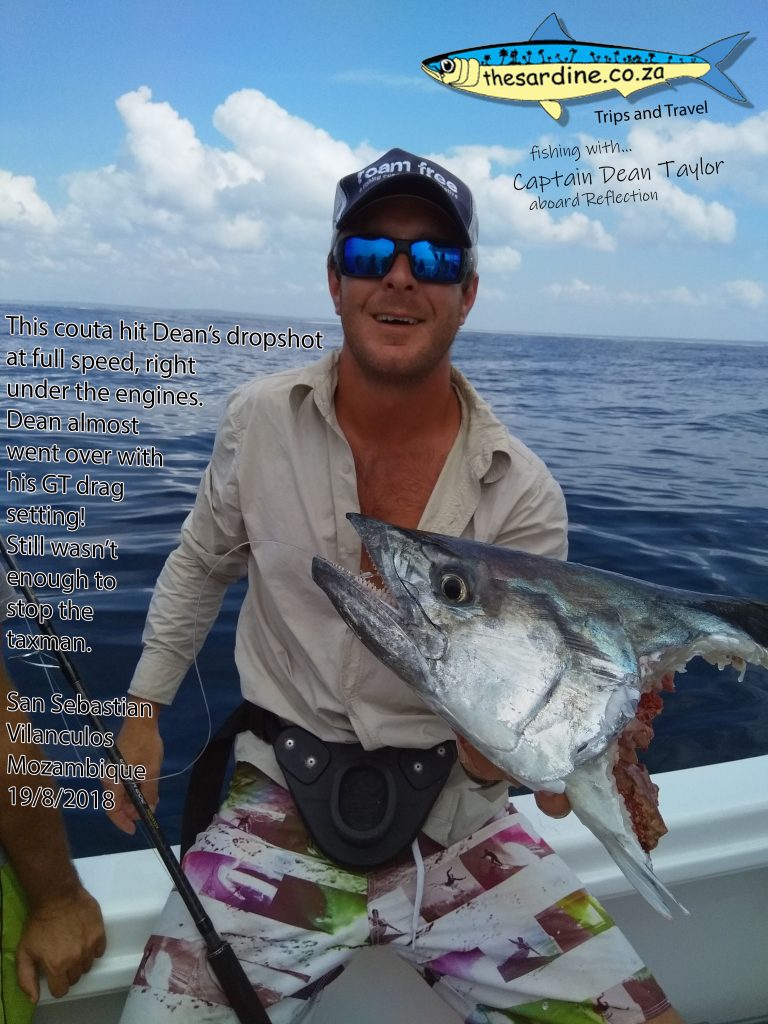
Sailfish
Unbelievably, right in these channels, you can quite easily bump into a sail. Or a baby black, in these self-same shallow waters. You can literally target these smaller billfish, by fishing really shallow.
Queenfish
There are two types of queenfish to target in the shallows around the islands. Let’s start with the highly sought-after Talang queenfish. You can find these guys hanging around Paradise Island most often. You will find them in other places, but Paradise is really their home around here. I am not going to tell anyone exactly where either. You go find your very own Talang to add to your species list.
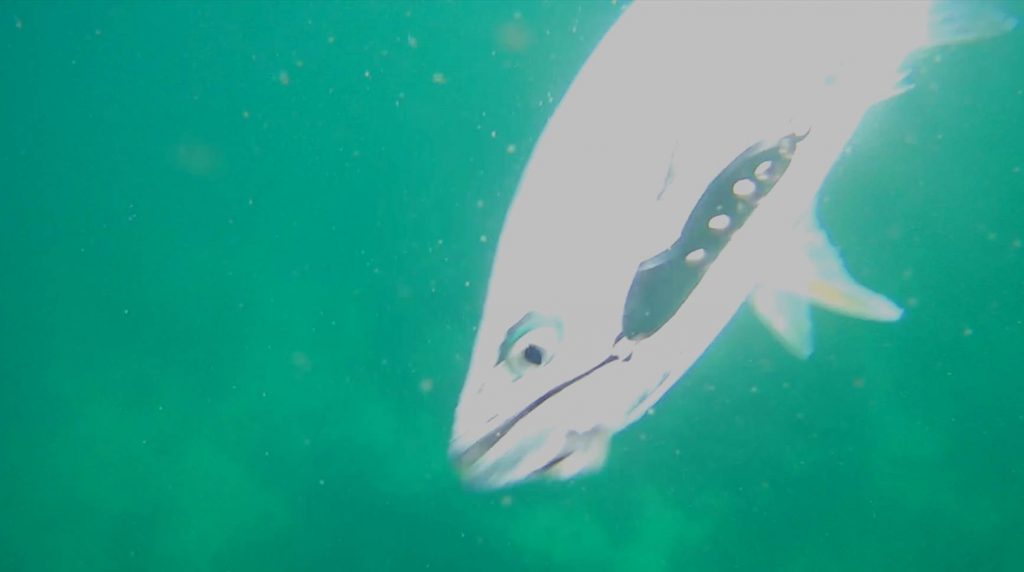
The other queenfish gets a whole lot bigger. And meaner. These fish jump and cartwheel all over the place. Wannabe billfish, all they need to learn is to tailwalk. You might want to tackle up if these guys come into the scene.
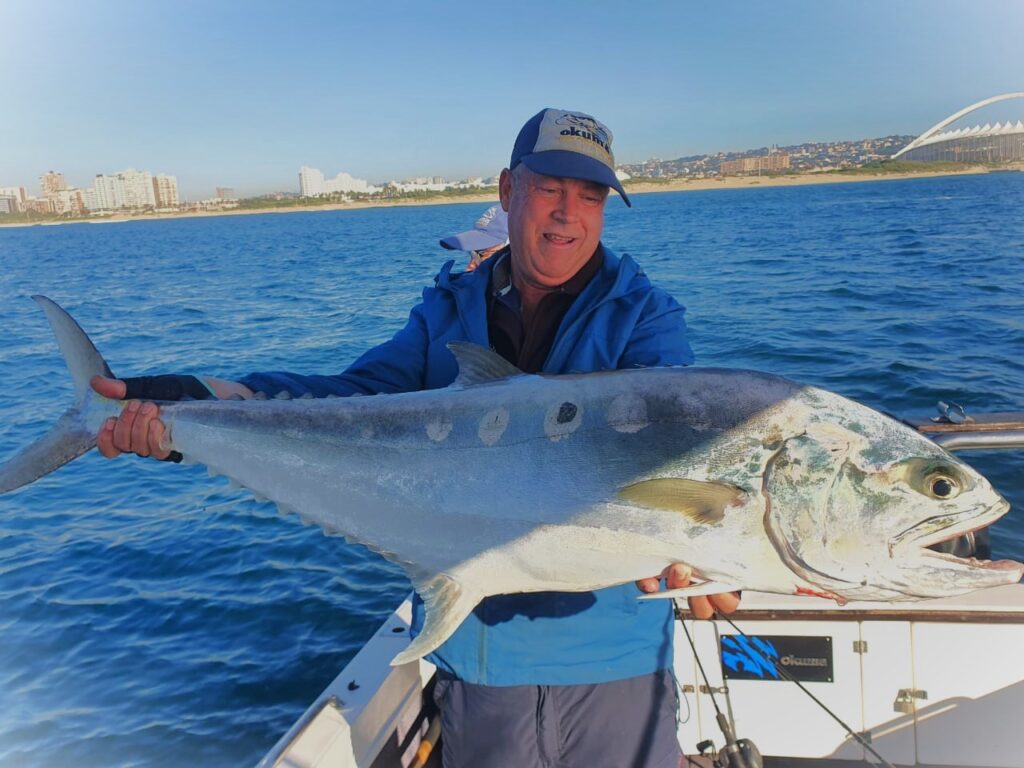
Other suspects
Include the plentiful bonito species. So many more kingfish species it’s hard to count. Wolf herring. Milkfish. Bonefish. All love to hang out shallow and terrorise the many bait balls of karapauw around the place.
In closing…all this action does not go unnoticed by the locals. I was sitting at the Landrey house on Benguerra Island, in the late afternoon. I had my chef with me, we were trying to get signal to communicate out to the mainland. With the two of us staring out over the water to Vilankulos – in the bright afternoon glare, a huge shark took to the air from out of the channel in front of us. It was a good kilometre away. And I doubt that these big animals would come too close into the shallows around the islands. But I saw him. In full hunting mode, right on the inside of Benguerra.
Another big bonus is that nobody gets seasick in these flat and calm places. And if they do feel a bit iffy, they can simply be dropped off on the nearest island. To be retrieved later.
We have organised many options for you to experience this light-tackle paradise with. From a liveaboard catamaran that sleeps 6 to 8, and has a tender, plus a marlin boat. To small purpose-built channel runners fully equipped for this light tackle genre. And everything in between.
Including a dhow mission if you like sailing!
Get in touch with Sean on umzimkulu@gmail.com or +27793269671. And lets gooooo!
